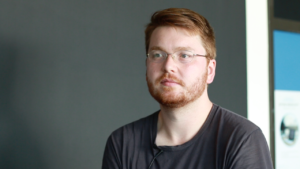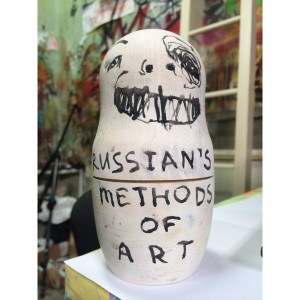Currently I am preparing Das Kongo Tribunal. At the same time I work on another project in Brussels The Civil Wars. The inquiries for support with television stations and film funds are in process but I don’t know exactly what will work in the end. I stopped publishing books with the underlying event or project, because I lose grip of what happened during and after the project. Now, the books are published a year later, so you have the time to gather the material. At the same time, this often times means less people buy the book, because it is not up to date. If a project is not funded at all, I don’t start with it. Simply for the fact, that I am unable to hire anyone. But I do start as soon as a small funding is in prospect. One of the reasons why my projects never really make a lot of money is that we start too soon. If you think about film funding: It’s two years of funding before you can start. With us, these time frames are more like a maximum of six months. That’s what makes it difficult. One could say, we are always just able to make the project happen. It is never a financially lucrative thing. What shall I say? How it’s exactly going to happen, is not predictable. Often the television joins later, for example. Doing the The Moscow Trials I noticed, that the presence of six cameras transforms the event completely. With the The Zurich Trials I knew I would need six cameras again for the second process shortly afterwards. The Moscow Trials had been financially devastating. I basically paid the whole production myself. And I knew somebody else would have to do that next time. That’s why I asked a TV-station. I had a deal that they would do live editing. We wanted to have live editing, which would be projected back into the room with the performance: to stir it up a bit, to integrate the live shot. For presenting Hate Radio at the festival in L’Avignon I did a new version. I rewrote the script for that. This is of course differs. It changes the situation. When I made the voice-over for The Moscow Trials. I integrated a voice-over into the film. But then realized it’s difficult to integrate a voice-over into a film that will be published in a few months. The recordings must refer to the shots but also has to refer to the potential freedom of Pussy riot when it is published. And it must work in case of a longer sentence, too. You don’t know any of these things. Perhaps that’s the problem with political art. You are subjected to forces, you can’t predict and the field you’re working on can totally change while you are doing it. And even after you have done it.
Aktuell mache ich ein Projekt, das heißt „Das Kongo Tribunal“, oder bereite ich vor. Und ein anderes mache ich, das heißt „The Civil Wars“ in Brüssel. Und da bin ich am Fernsehen dran und Filmfonds dran aber ich weiß nicht genau was klappt. Was ich beispielsweise aufgehört habe, ist Bücher gleichzeitig zu publizieren wie, das zu Grunde liegende, Event. Weil ich dann irgendwie extrem viel davon verliere, was eigentlich während dessen und nachher passiert. Also jetzt erscheint das Buch meistens ein Jahr später. Damit man das alles noch sammeln kann. Gleichzeit kaufen das Buch natürlich weniger Leute, weil es weniger aktuell ist. Also, wenn etwas gar nicht finanziert ist, so starte ich es logischerweise nicht, weil… dann kann ich niemanden engagieren. Das startet aber eigentlich, sobald Finanzierungen – zumindest im kleinen Rahmen – in Aussicht sind. Also einer der Gründe warum meine Projekte eigentlich nie so richtig Geld abgeworfen haben, ist dass wir immer zu schnell starten. Man kennt das ja von der Filmförderung. Man muss mal zwei Jahre lang fördern, bis man quasi anfangen darf. Bei uns sind diese Abstände maximal ein halbes Jahr und dadurch werden die Dinge schwer. Also wir können es eigentlich immer gerade so machen, könnte man sagen. Es ist nie eine finanziell lukrative Geschichte. Wie soll ich sagen. Was genau die Verwertungskette ist, ist natürlich unklar. Also oft kommt beispielsweise das Fernsehen später dazu. Ich habe aber bei den Moskauer Prozessen gemerkt, dass die Anwesenheit von sechs Kameras, das Event komplett verwandelt hat. Also den Prozess. Und dann wusste ich, dass ich beim zweiten Prozess beispielsweise die Züricher Prozesse, die kurz nachher waren, auch wieder sechs Kameras brauchte. Bei den Moskauer Prozessen war es, wie soll ich sagen, finanziell verheerend. Da habe ich die Produktion des Kinofilms quasi selber bezahlt. Und da wusste ich, das muss jemand anderes machen. Deshalb hab ich das Fernsehen gefragt, ob sie das machen. Ich hatte aber einen deal, dass der Live-Schnitt gemacht wird. Also, dass es einen Live-Schnitt gibt, der zurück projiziert wird in den Raum, um den Raum, wo die Performance stattfindet, weiter aufzuheizen. Dass man das schon einspeist. Bei Hate Radio für das Festival in L´Avignon habe ich noch mal eine neue Fassung gemacht. Da habe ich die Texte noch mal umgeschrieben. Das ist natürlich ein Filmemacher anders. Also es ändert sich. Ich habe es gemerkt, als ich jetzt die Off-Stimme für die Moskauer Prozesse gemacht habe. Also ich spreche so ein bisschen aus dem Off in den Film rein. Und es ist schwierig mit einer Off-Stimme zu sprechen, die quasi damit rechnet, dass der Film erst in vier Monaten rauskommt. Und auf die Aufnahmen Bezug nehmen muss aber auch darauf Bezug nehmen muss, dass wenn er rauskommt, beispielsweise Pussy Riot in Freiheit ist, oder vielleicht wird die Strafe ja auch verlängert, man weiß all diese Dinge nicht. Das ist das Problem. Vielleicht von politischer Kunst. Dass du sowohl Kräften unterworfen bist, die du nicht kennst. Wie, dass sich das Feld total verändern kann, während du es tust und nachdem du es getan hast.

















